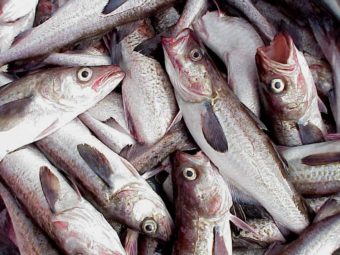The farm bill that Congress passed last week will be known for many things. It increases subsidies for farmers and legalizes industrial hemp. But for Alaska, the bigger impact might be what the bill does for fish sticks served in school lunchrooms across America.
The National School Lunch Program has for decades required school districts to buy American-made food. But that doesn’t always happen when it comes to fish.
“There was a major loophole,” Sen. Dan Sullivan, R-Alaska, said. “Major. That allowed, for example, Russian-caught pollock, processed in China with phosphates, sent back to the United States for purchase in the U.S. school lunch program.”

Let’s break that down: Rather than buy fish sticks made of Alaska pollock, many school districts buy fish caught in Russian waters that are frozen, sent to China, thawed, cut up, sometimes pumped up with additives, refrozen and sent to the U.S. And it qualifies for a “Product of U.S.A.” label because it’s battered and breaded here.
Aside from being bad for Alaska’s fishing industry, Sullivan said the twice-frozen Russian pollock is bad seafood, and kids won’t like fish day at school.
“Literally turns a generation of kids in America off of seafood when they have this as fish sticks in their school lunches,” Sullivan said.
Alaska pollock producers have been working on this problem for years. Jim Gilmore, director of public affairs at the At-sea Processors Association, said up to half of the pollock served in schools now is from Russia. Gilmore credits Sullivan for getting a provision in the farm bill that closes the school lunch loophole — or clarifies what many thought the “Buy American” requirement meant all along.
“We wanted it to be unambiguous, absolutely clear that product has to be U.S.-harvested seafood in order to qualify for food purchases for school when you’re using federal dollars,” Gilmore said.
Gilmore said an exception remains allowing school districts to buy foreign product if it’s substantially cheaper.
“So schools will still have that opportunity if we can’t be competitive on price,” he said, “but we’re confident we can be competitive on price.”
The school lunch amendment doesn’t change the labeling rule that allows Russian pollock that’s breaded in the U.S. to be sold as a “Product of U.S.A.” Gilmore said that’s a larger fight for another day.
The pollock producers didn’t fight this battle alone. They joined forces with American producers of apple sauce, canned peaches and dozens of other stalwarts of the school lunch tray.